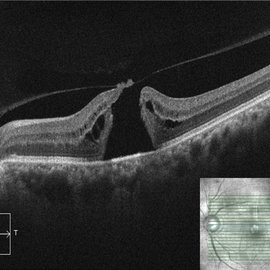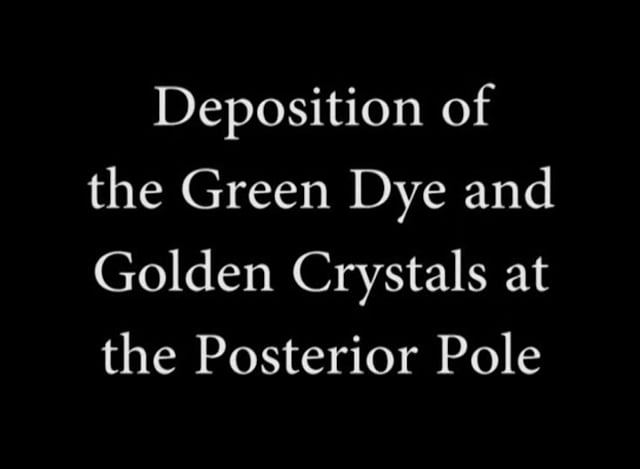Search results (38 results)
-
 OCT Evidence of VMT Resulting in Full Thickness Macular Hole
OCT Evidence of VMT Resulting in Full Thickness Macular Hole
Dec 24 2020 by Deepak Bhojwani, MS
OCT image of a patient (with past history of focal VMT ) progressing to full thickness macular hole. Note the posterior hyaloid attachment over the torn edges of fovea.
Photographer: DEEPAK BHOJWANI
Condition/keywords: full thickness macular hole, optical coherence tomography (OCT), vitreomacular traction (VMT)
-
 Thickened Posterior Hyaloid in Stickler Syndrome
Thickened Posterior Hyaloid in Stickler Syndrome
Feb 12 2021 by Anfisa Ayalon, MD
SD-OCT of 16-year-old male with Stickler Syndrome. Note a thickened and adherent posterior hyaloid.
Photographer: Anfisa Ayalon, MD., Meir Medical Center, Kfar Saba, Israel.
Condition/keywords: Stickler Syndrome, thickening of the posterior hyaloid
-
Thickening of the Posterior Hyaloid
Dec 12 2020 by Anyssa Montenegro
Color fundus photograph of the right eye of a 36-year-old man showing thickening of the posterior hyaloid associated with an epiretinal membrane due to ocular toxoplasmosis.
Photographer: Anyssa Montenegro, Centro Brasileiro da Visão, Brasília-DF, Brazil
Condition/keywords: epiretinal membrane (ERM), ocular toxoplasmosis, thickening of the posterior hyaloid
-
 Macular Traction in PDR
Macular Traction in PDR
Dec 13 2013 by Mallika Goyal, MD
Macular traction from thickened posterior hyaloid and epiretinal membrane in a patient with lasered proliferative diabetic retinopathy. The comparison depicts spontaneous release of traction from March 2012 (lower figure) to present status, December 2013 (upper figure).
Photographer: Mallika Goyal, MD, Apollo Health City, Hyderabad, India
Condition/keywords: macular traction
-
 Asteroid Hyalosis, Posterior Vitreous Separation
Asteroid Hyalosis, Posterior Vitreous Separation
Dec 10 2012 by Yale L. Fisher, MD
VA 20/20. In asteroid hyalosis, there is a space between the posterior hyaloid face and the calcified asteriod lesions. Use gain to differentiate between VH and asteroid hyalosis (asteroid still present when gain is decreased).
Condition/keywords: video
-
---thumb.jpg/image-square;max$300,300.ImageHandler) Acute optic nerve edema due to JODM
Acute optic nerve edema due to JODM
Apr 4 2014 by H. Michael Lambert, MD
23-year-old white female. Acute optic disc edema if JODM. VA 20/40 OU.
Photographer: Donald Lowd
Condition/keywords: diabetes, posterior hyaloid contraction
-
---thumb.jpg/image-square;max$300,300.ImageHandler) Acute optic nerve edema due to JODM
Acute optic nerve edema due to JODM
Apr 4 2014 by H. Michael Lambert, MD
23-year-old white female. Acute optic disc edema if JODM. VA 20/40 OU. Pregnant.
Photographer: Donald Lowd
Condition/keywords: diabetes, posterior hyaloid contraction
-
 Advanced Proliferative Diabetic Retinopathy
Advanced Proliferative Diabetic Retinopathy
Apr 9 2025 by Gustavo Uriel Fonseca Aguirre
B-mode ultrasound of a patient with long-standing poorly controlled diabetes demonstrates characteristic findings of advanced proliferative diabetic retinopathy. The examination reveals moderate vitreous hemorrhage appearing as diffuse hyperechoic opacities throughout the vitreous cavity, along with a posterior hyaloid membrane densely infiltrated by hemorrhagic material, showing irregular thickening and increased reflectivity. A mild subhyaloid hemorrhage is visible as a subtle hyphema-like space anterior to the retinal surface. The study documents a total tractional retinal detachment, evidenced by rigid retinal folds with clear insertion points of vitreous strands, accompanied by a significant subretinal hemorrhage seen as a prominent hyperechoic collection beneath the elevated retina. These findings collectively illustrate the severe vitreoretinal interface pathology characteristic of end-stage diabetic eye disease, with predominant tractional components and distinct echographic stratification of hemorrhagic layers - from anterior vitreous involvement to deeper subretinal blood accumulation.
Photographer: Gustavo U. Fonseca Aguirre, Hospital Conde de Valenciana, Ciudad de México
Condition/keywords: diabetic retinopathy, tractional retinal detachment, Vitreous hemorrhage
-
 Aggressive Posterior Retinopathy of Prematurity
Aggressive Posterior Retinopathy of Prematurity
Oct 9 2012 by Audina M. Berrocal, MD FASRS
Aggressive posterior Type 1 ROP with bleeding from regression of the posterior hyaloid artery
Photographer: Ditte Hess CRA, BPEI
Imaging device: RETCAM
Condition/keywords: retinopathy of prematurity (ROP)
-
 Asteroid Hyalosis, Vitreous Face Attached
Asteroid Hyalosis, Vitreous Face Attached
Dec 10 2012 by Yale L. Fisher, MD
In asteroid hyalosis, accumulations of calcium soaps dispersed throughout the vitreous produce bright echoes in the usually echolucent vitreous. The appearance of asteroid hyalosis should not be confused with that of vitreous hemorrhage or vitritis. Many of the larger aggregates in asteroid hyalosis are easily seen as the gain is reduced to below 60 db, unlike vitreous hemorrhage or vitritis which usually disappears at low gain settings. There is also an area of clear echolucent vitreous between the posterior hyaloid face and the asteroid particles, which is usually not present in vitreous hemorrhage or vitritis.
Condition/keywords: video
-
Branch Retinal Vein Occlusion-Posterior Hyaloid Proliferation
Dec 20 2017 by Narciso F. Atienza, MD, MBA, FASRS, FPCS, FPAO.
72-year-old female with ischemic branch retinal vein occlusion. Neovascular proliferation on the posterior hyaloid. Background shows ischemic BRVO with florid neovascularization emanating from the disc.
Photographer: Narciso Atienza, Jr. MD, MBA
Imaging device: Topcon
Condition/keywords: branch retinal vein occlusion (BRVO)
-
Branch Retinal Vein Occlusion-Posterior Hyaloid Proliferation
Dec 20 2017 by Narciso F. Atienza, MD, MBA, FASRS, FPCS, FPAO.
72-year-old female with ischemic branch retinal vein occlusion. Neovascular proliferation on the posterior hyaloid. Background shows ischemic BRVO with florid neovascularization emanating from the disc.
Photographer: Narciso Atienza, Jr. MD, MBA
Imaging device: Topcon
Condition/keywords: branch retinal vein occlusion (BRVO)
-
Branch Retinal Vein Occlusion-Posterior Hyaloid Proliferation
Dec 20 2017 by Narciso F. Atienza, MD, MBA, FASRS, FPCS, FPAO.
72-year-old female with ischemic branch retinal vein occlusion. Neovascular proliferation on the posterior hyaloid. Background shows ischemic BRVO with florid neovascularization emanating from the disc.
Photographer: Narciso Atienza, Jr. MD, MBA
Imaging device: Topcon
Condition/keywords: branch retinal vein occlusion (BRVO)
-
Branch Retinal Vein Occlusion-Posterior Hyaloid Proliferation
Dec 20 2017 by Narciso F. Atienza, MD, MBA, FASRS, FPCS, FPAO.
72-year-old female with ischemic branch retinal vein occlusion. Neovascular proliferation on the posterior hyaloid. Background shows ischemic BRVO with florid neovascularization emanating from the disc.
Photographer: Narciso Atienza, Jr. MD, MBA
Imaging device: Topcon
Condition/keywords: branch retinal vein occlusion (BRVO)
-
Branch Retinal Vein Occlusion-Posterior Hyaloid Proliferation
Dec 20 2017 by Narciso F. Atienza, MD, MBA, FASRS, FPCS, FPAO.
72-year-old female with ischemic branch retinal vein occlusion. Neovascular proliferation on the posterior hyaloid. Background shows ischemic BRVO with florid neovascularization emanating from the disc.
Photographer: Narciso Atienza, Jr. MD, MBA
Imaging device: Topcon
Condition/keywords: branch retinal vein occlusion (BRVO)
-
Branch Retinal Vein Occlusion-Posterior Hyaloid Proliferation
Dec 20 2017 by Narciso F. Atienza, MD, MBA, FASRS, FPCS, FPAO.
72-year-old female with ischemic branch retinal vein occlusion. Neovascular proliferation on the posterior hyaloid. Background shows ischemic BRVO with florid neovascularization emanating from the disc.
Photographer: Narciso Atienza, Jr. MD, MBA
Imaging device: Topcon
Condition/keywords: branch retinal vein occlusion (BRVO)
-
Branch Retinal Vein Occlusion-Posterior Hyaloid Proliferation
Jun 24 2018 by Narciso F. Atienza, MD, MBA, FASRS, FPCS, FPAO.
62-year-old male patient with sudden loss of vision on the left eye for 3 days. Wider picture of the central retina showing the relationship of the non-perfused fundus to that of the retina.
Photographer: Narciso Atienza, Jr. MD MBA, Legazpi Eye Center, Cardinal Santos Medical Center
Condition/keywords: branch retinal artery occlusion (BRAO)
-
 Compared With June 2011
Compared With June 2011
Dec 13 2013 by Mallika Goyal, MD
Macular traction from thickened posterior hyaloid and epiretinal membrane in a patient with lasered proliferative diabetic retinopathy. The comparison depicts spontaneous release of traction from June 2011 (lower figure) to present status, December 2013 (upper figure).
Photographer: Mallika Goyal, MD, Apollo Health City, Hyderabad, India
Condition/keywords: macular traction
-
 Large Sub-ILM Macular Hemorrhage
Large Sub-ILM Macular Hemorrhage
Jan 15 2020 by Deepak Bhojwani, MS
Montage image of a young hypertensive gentlemen with huge macular hemorrhage. OCT is pointing the plane of heme to be sub-ILM. High reflective taut membrane (block arrow) The line arrow shows the posterior hyaloid (low reflective band).
Photographer: Deepak Bhojwani, Raghudeep Eye Hospital, Ahmedabad
Imaging device: ZEISS VISUCAM 500
Condition/keywords: hypertension, macula lesion, ruptured macroaneurysm
-
 Lutein: A New Dye for Chromovitrectomy
Lutein: A New Dye for Chromovitrectomy
May 16 2014 by Mauricio Maia, MD, PhD
This video shows a new dye for vitreoretinal surgery comprised of soluble lutein/zeaxanthin 1% and brilliant blue 0.025 %. The green dye was deposited on the posterior pole; vigorous dye flushing into the vitreous cavity was unnecessary. The dye indirectly shows the posterior hyaloid by deposition of the golden lutein crystals. The ILM stained greenish-blue; No evidence of toxicity was observed.
Photographer: Mauricio Maia, Federal University of São Paulo
Condition/keywords: chromovitrectomy, internal limiting membrane (ILM) peeling, lutein
-
Macular Hematoma Secondary Valsalva Maneuver
Oct 14 2021 by Islam bechakh
A 32-year-old man, who has presented for 02 months, a macular hematoma secondary to a Valsalva maneuver. He benefited from an attempt to open the hematoma with a Yag laser, but to no avail. We operated on and performed a 23G vitrectomy with posterior vitreous detachment, and discovered an epiretinal membrane which separated the hematoma from the posterior hyaloid. After removal of this membrane and aspiration of red blood cells and fibrin, the macula regained a normal appearance with good functional recovery.
Photographer: Islam Bechakh
Condition/keywords: epiretinal membrane (ERM), ERM, Macular hematoma, Valsalva maneuver
-
 Macular Hole
Macular Hole
Jan 3 2022 by Thirumalesh Mochi Basavaraj, MD
Swept source OCT of a 65-year-old patient with posterior hyaloid separation and a large macular hole with undermined edges.
Photographer: Puttaswamy Narayana Nethralaya Bangalore
Imaging device: Topcon Dri Triton
Condition/keywords: large macular hole, posterior cyclitis hyaloid separation, swept source OCT
-
 Macular Traction in PDR
Macular Traction in PDR
Dec 13 2013 by Mallika Goyal, MD
Macular traction from thickened posterior hyaloid and epiretinal membrane in a patient with lasered proliferative diabetic retinopathy. Visual acuity is 20/25. Other eye has extensive combined traction-rhegmatogenous retinal detachment.
Photographer: Mallika Goyal, MD, Apollo Health City, Hyderabad, India
Condition/keywords: macular traction
-
Macular Traction in PDR
Dec 13 2013 by Mallika Goyal, MD
Fundus photograph of right eye of a 56-year-old diabetic lady shows a sheet of thickened posterior hyaloid and epiretinal membrane with traction on macular center, Visual acuity is 20/25. Other eye has extensive combined traction-rhegmatogenous retinal detachment.
Photographer: Mallika Goyal, MD, Apollo Health City, Hyderabad, India
Condition/keywords: macular traction
-
Macular Traction in PDR
Dec 13 2013 by Mallika Goyal, MD
Fundus photograph of right eye of a 56-year-old diabetic lady shows a sheet of thickened posterior hyaloid and epiretinal membrane with traction on macular center, Visual acuity is 20/25. Other eye has extensive combined traction-rhegmatogenous retinal detachment.
Photographer: Mallika Goyal, MD, Apollo Health City, Hyderabad, India
Condition/keywords: macular traction

 Loading…
Loading…